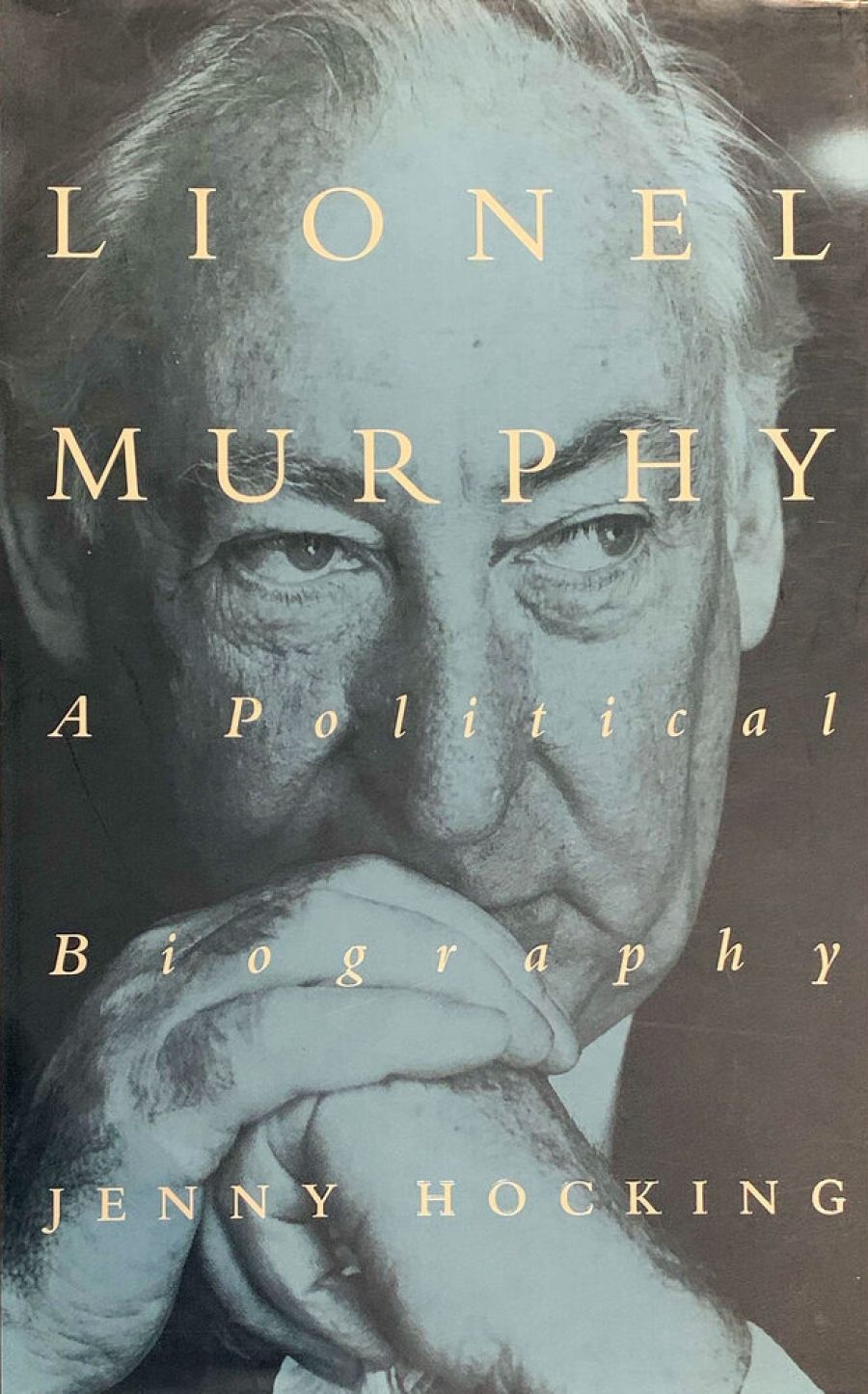
- Free Article: No
- Contents Category: Biography
- Review Article: Yes
- Online Only: No
- Custom Highlight Text:
Lionel Murphy was a prominent and colourful figure in the ALP renaissance of the 1960s and 1970s, and a significant legal intellectual. The extraordinary saga of his final years, when he was hounded by political foes and the press, created a farrago of misunderstanding and innuendo that clouded his reputation. Jenny Hocking has set out to recover Murphy’s public life and to correct the record. Curiously, her emphasis on philosophy and consistency works against the interest of this story: the larrikin edge and the complexity of the man are smoothed away.
- Book 1 Title: Lionel Murphy
- Book 1 Subtitle: A political biography
- Book 1 Biblio: Cambridge University Press, $39.95 hb, 376 pp
- Book 1 Readings Link: booktopia.kh4ffx.net/Zn1ng
The story she tells is straightforward, to a fault. From an Irish-Catholic cultural context (though his family had lapsed from the Church, resisting its institutional authority), Murphy was shaped as a social democrat and a questioner of the establishment. He would live out what Hocking represents as quintessential Australian (and Catholic) ideals of social justice, anti-authoritarianism and independence. Serious-minded and curious as a young man, he initially took a science degree, but growing interest in civil liberties and public affairs led him to return to Sydney University to study law. A bright and single-minded student, he took his bar exams and was admitted even before completing his degree. Establishing connections in the labour movement, he rapidly built up what was predominantly an industrial practice, and was thus drawn into the big issues of the 1950s ‘the Split and the 1960s’ ALP reform. By the late 1950s he was vying for federal ALP preselection, for a lower house seat, but the antipathy of right-wing NSW party officers against this stalwart of the left blocked his ambition. Instead, with the supporting machinations of key union figures, he was to gain Senate preselection, against the wishes of the right-wing machine, and sat in the Senate from 1961 to 1975. In 1975, he was appointed to the High Court by the Whitlam government in which he had been attorney-general.
The means by which Murphy gained ALP Senate leadership, his elaboration of the Senate committee system (and enhancement of Senate power, which would boomerang against the ALP), his libertarian influence on Whitlam’s reformist drive (often against Whitlam’s will), his centrality in legal reform and cultural transformation as a crusading Attorney-General, his naivety in the famous raid on ASIO, all these are detailed by Hocking. The most moving part of her story is in her careful account of how, at his apogee having been translated to the High Court, endured years of bitter antagonism from the irascible chief justice, Garfield Barwick, and finally emerged as a respected elder statesman in the cause of social justice’ he was torn down by concocted evidence of ‘improper behaviour’, peddled by a malleable press, and driven by malevolent conservative interests determined that he should never be chief justice. Having battled through three years of parliamentary and legal inquiry, none of which had established any case to answer, he succumbed to cancer and died, the clouds of these final tribulations still shadowing his name.
The case for Lionel Murphy is well-put in these final chapters. No one comes out of these sorry episodes well – not the conservative parties, not the legal establishment, certainly not the press (especially those ostensibly liberal organs, the National Times and The Age), and none of the senior figures in the Hawke government. Murphy, in Hocking’s account, was a paragon of consistency, a lion-hearted defender of civil liberties and social justice who lived (and, implicitly, died) by his ideals. Hocking offers one of the most coherent accounts we have of a conviction politician – ‘a man at the opposite pole from Graham Richardson’s aphorism, “whatever it takes”’ – and her story shows the retribution visited upon those who will not sacrifice conviction for expediency.
For all that, I finished this biography feeling uneasy. There is much valuable detail here, and many gaps filled in, but there is also oversimplification: this is life on a single track. Could Murphy have been so seamlessly, smoothly socialised as the carrier of Irish-Australian ideals? Apart from the campaigns and the judgments and the party politics, how did this man live? How did he think? (We are given many quotations, but no extended analysis of a speech, an argument, or a judgment.) How did he work, what modes did he favour, how did he put a case together, how did he draw on others? How did he make friends and build networks? Was it ideas and ability or networks and ambition which fuelled his ascent? Which friends lasted and which fell away? And why? Does a failed marriage, or a brother turned away when Murphy had reached his nadir, tell us anything about broader interpersonal dynamics? Did his single-mindedness shade into hubris? What aspects of his persona and his associations provided the hooks on which the constructions of dubious behaviour could hang?
How, in the end, did he participate in his own downfall? Tragedy, after all, is more complex than the demolition of an idealist: it usually hinges on the resonance between the forces of destruction and the contradictions of the protagonist. Hocking has worked hard at resurrecting Murphy, and in so doing has made a useful contribution towards a better understanding of post-war politics, and of the vicissitudes of the left in the ALP. But behind this worthy and competent book, one senses a more complicated ‘and perhaps more tragic’ story waiting to be told.


Comments powered by CComment